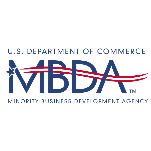Located within the Department of Commerce, the Minority Business Development Agency (MBDA) is the “only federal agency created specifically to foster the establishment and growth of minority-owned businesses in America.” Through management, technical and financial support programs, the agency aims at increasing the growth and competitiveness of minority-owned business, toward the goal of entrepreneurial parity.
The civil rights movement spurred various means of government intervention in, among other things, minority business and entrepreneurial development. As part of an initiative to foster minority capitalist development, in 1969 President Nixon established the Office of Minority Business Enterprise (OMBE), with the aim of providing management and technical assistance, information and advocacy for private-sector minority business development. The Office was renamed the Minority Business Development Agency and transferred to the Department of Commerce in 1979.
Early emphasis was focused on black-owned business development, but has since expanded to include other racial and ethnic minorities.
Information about Loans and Grants
Information about Contracts and Certifications
|
Top 10 Contractors
|
|
|
Ace Info Solutions, Inc.
|
$4,308,239
|
|
Nortel Networks Corporation
|
$2,552,000
|
|
Felix R. Sanchez
|
$1,356,000
|
|
Viva Entertainment, LLC
|
$823,245
|
|
Turner, Harper & Associates, Inc.
|
$580,000
|
|
TRT Holdings, Inc.
|
$427,606
|
|
H Group Holding, Inc.
|
$387,000
|
|
Onvia Inc.
|
$239,000
|
|
Xerox Corporation
|
$224,542
|
|
Management Technology, Inc.
|
$140,000
|
|
Top 5 Congressional Districts Where Work Has Been Performed
|
|
|
District of Columbia (Eleanor Holmes Norton)
|
$6,591,402
|
|
Virginia 11 (Thomas M. Davis / Gerald E. Connolly)
|
$2,552,000
|
|
Virginia 10 (Frank R. Wolf)
|
$810,958
|
|
Maryland 04 (Albert Russell Wynn / Donna F. Edwards)
|
$580,000
|
|
Maryland 08 (Constance A. Morella / Chris Van Hollen)
|
$442,054
|
Ace Info Solutions, Inc.: An information-technology consulting firm providing services to government agencies and commercial clients. Company was formed in December 2000 and is located in Reston, VA. Ace Info received their first major Government contract in 2003 with the U.S. Department of Commerce and have since then, acquired contracts from other Government agencies such as the U.S. Department of Agriculture, the U.S. Environmental Protection Agency, the U.S. Department of Interior, the U.S. Department of Justice and the U.S. Department of Homeland Security. The company is lead by Jay Challa, the acting President and CEO.
TerraCom
National Hispanic Foundation for the Arts
Company Profile (U.S. Dept. of Commerce)
Company Text File (U.S. General Services Administration)
Redefining “Minority Business”
A new US Definition of “Minority Business”: lessons from the first four years
(by Matthew C. Sonfield, Entrepreneurship & Regional Development) (PDF)
SBA Proposal Sparks Differences of Opinion (by Becky Gillette, Mississippi Business Journal)
“Minority Business Development Agency (1997 appropriation: $28.0 million)
. The Minority Business Development Agency attempts to promote the development of minority-owned businesses through the provision of management and technical assistance and assistance in gaining access to capital. MBDA activities often focus on helping minority-owned businesses chase government contracts. To encourage the development of minority-owned businesses, the federal government should instead focus on removing the many government impediments to the formation and growth of minority firms, such as unnecessary regulations and the onerous burden of taxation.”
- Table of Contents
- Overview
- History
- What it Does
- Where Does the Money Go
- Controversies
- Suggested Reforms
- Comments
- Leave a comment


On April 17, 2014, Commerce Secretary Penny Pritzker appointed Alejandra Y. Castillo to lead the Minority Business Development Agency, which aims at increasing the growth and competitiveness of minority-owned business, toward the goal of entrepreneurial parity.
Castillo was born in New York City to immigrants from the Dominican Republic. Her father was a small business owner in the Bronx and Castillo often relates his experiences to audiences. When she was 11 years old, her family moved to the Dominican Republic and she lived there until she was 19, with a year in Portugal in a study abroad program.
She attended the State University of New York at Stony Brook, where she was involved in fencing. Castillo earned a B.A. in economics and political science, and went on to the University of Texas, where she earned a Master’s in public policy in 1995. Her first job after college was as a writer/researcher for the Council on Hemispheric Affairs.
Early in her career, Castillo worked for the Democratic National Committee (DNC) and had a tangential involvement in a campaign finance controversy involving donations from Roger Tamraz, who also lobbied the Clinton administration to support a pipeline he wanted to build. Castillo wrote a memo in July 1995 warning DNC Chairman Donald Fowler to be wary of Tamraz because of “his past involvement in shaky international business and para-military organizations.” She added, “Pay attention to these warning signals.”
In 1992, as a Congressional Hispanic Caucus Fellow, she worked in the Poverty and Health Office of the Senate Labor and Human Resources Committee, which at the time was headed by Sen. Edward Kennedy (D-Massachusetts).
Castillo also served in the Clinton administration White House as a senior policy analyst to the deputy director at the White House Office of National Drug Control Policy. After Bill Clinton’s tenure as U.S. president ended, Castillo earned her law degree from American University in 2004, clerked for a D.C. Superior Court judge and worked as an attorney in private practice and for nonprofits.
She was a founding member of the Dominican American National Roundtable and was interim executive director of the Hispanic National Bar Association. In 2008 she worked for the Hillary Clinton for President campaign in Iowa.
Castillo joined the Commerce Department in 2008 as special advisor to Christopher Padilla, the under secretary for the U. S. Department of Commerce’s International Trade Administration. She was responsible for business outreach and intergovernmental affairs and assisted in the development of policy initiatives related to trade promotion and enforcement of U.S. trade laws.
In 2010, Castillo was named national deputy director of Minority Business Development Agency, and was moved up to the directorship in 2014.
In 2009 Castillo gained custody of two teenage nieces. She speaks Spanish and Portuguese.
-Steve Straehley, David Wallechinsky
To Learn More:
Alejandra Castillo on Linkedin
Leading a Powerful Agency under President Obama’s Administration, Alejandra Castillo Helps Minority Businesses Thrive. (Hispanic Executive) (pdf)

- Latest News
- D.C. Public Schools will Teach all Second-Graders to Ride a Bike
- New Rule in Germany Limits Sales of Sex-Themed E-Books to 10pm to 6am
- What Happened to the 6-Year-Old Tibetan Boy the Chinese Government Kidnapped 20 Years Ago?
- U.S. Ambassador to Turkey Photoshops his Hair Color to Mock Turkish Mayor
- Mystery Artist Calls Attention to Unfixed Potholes by Drawing Penises around Them
Located within the Department of Commerce, the Minority Business Development Agency (MBDA) is the “only federal agency created specifically to foster the establishment and growth of minority-owned businesses in America.” Through management, technical and financial support programs, the agency aims at increasing the growth and competitiveness of minority-owned business, toward the goal of entrepreneurial parity.
The civil rights movement spurred various means of government intervention in, among other things, minority business and entrepreneurial development. As part of an initiative to foster minority capitalist development, in 1969 President Nixon established the Office of Minority Business Enterprise (OMBE), with the aim of providing management and technical assistance, information and advocacy for private-sector minority business development. The Office was renamed the Minority Business Development Agency and transferred to the Department of Commerce in 1979.
Early emphasis was focused on black-owned business development, but has since expanded to include other racial and ethnic minorities.
Information about Loans and Grants
Information about Contracts and Certifications
|
Top 10 Contractors
|
|
|
Ace Info Solutions, Inc.
|
$4,308,239
|
|
Nortel Networks Corporation
|
$2,552,000
|
|
Felix R. Sanchez
|
$1,356,000
|
|
Viva Entertainment, LLC
|
$823,245
|
|
Turner, Harper & Associates, Inc.
|
$580,000
|
|
TRT Holdings, Inc.
|
$427,606
|
|
H Group Holding, Inc.
|
$387,000
|
|
Onvia Inc.
|
$239,000
|
|
Xerox Corporation
|
$224,542
|
|
Management Technology, Inc.
|
$140,000
|
|
Top 5 Congressional Districts Where Work Has Been Performed
|
|
|
District of Columbia (Eleanor Holmes Norton)
|
$6,591,402
|
|
Virginia 11 (Thomas M. Davis / Gerald E. Connolly)
|
$2,552,000
|
|
Virginia 10 (Frank R. Wolf)
|
$810,958
|
|
Maryland 04 (Albert Russell Wynn / Donna F. Edwards)
|
$580,000
|
|
Maryland 08 (Constance A. Morella / Chris Van Hollen)
|
$442,054
|
Ace Info Solutions, Inc.: An information-technology consulting firm providing services to government agencies and commercial clients. Company was formed in December 2000 and is located in Reston, VA. Ace Info received their first major Government contract in 2003 with the U.S. Department of Commerce and have since then, acquired contracts from other Government agencies such as the U.S. Department of Agriculture, the U.S. Environmental Protection Agency, the U.S. Department of Interior, the U.S. Department of Justice and the U.S. Department of Homeland Security. The company is lead by Jay Challa, the acting President and CEO.
TerraCom
National Hispanic Foundation for the Arts
Company Profile (U.S. Dept. of Commerce)
Company Text File (U.S. General Services Administration)
Redefining “Minority Business”
A new US Definition of “Minority Business”: lessons from the first four years
(by Matthew C. Sonfield, Entrepreneurship & Regional Development) (PDF)
SBA Proposal Sparks Differences of Opinion (by Becky Gillette, Mississippi Business Journal)
“Minority Business Development Agency (1997 appropriation: $28.0 million)
. The Minority Business Development Agency attempts to promote the development of minority-owned businesses through the provision of management and technical assistance and assistance in gaining access to capital. MBDA activities often focus on helping minority-owned businesses chase government contracts. To encourage the development of minority-owned businesses, the federal government should instead focus on removing the many government impediments to the formation and growth of minority firms, such as unnecessary regulations and the onerous burden of taxation.”
Comments


On April 17, 2014, Commerce Secretary Penny Pritzker appointed Alejandra Y. Castillo to lead the Minority Business Development Agency, which aims at increasing the growth and competitiveness of minority-owned business, toward the goal of entrepreneurial parity.
Castillo was born in New York City to immigrants from the Dominican Republic. Her father was a small business owner in the Bronx and Castillo often relates his experiences to audiences. When she was 11 years old, her family moved to the Dominican Republic and she lived there until she was 19, with a year in Portugal in a study abroad program.
She attended the State University of New York at Stony Brook, where she was involved in fencing. Castillo earned a B.A. in economics and political science, and went on to the University of Texas, where she earned a Master’s in public policy in 1995. Her first job after college was as a writer/researcher for the Council on Hemispheric Affairs.
Early in her career, Castillo worked for the Democratic National Committee (DNC) and had a tangential involvement in a campaign finance controversy involving donations from Roger Tamraz, who also lobbied the Clinton administration to support a pipeline he wanted to build. Castillo wrote a memo in July 1995 warning DNC Chairman Donald Fowler to be wary of Tamraz because of “his past involvement in shaky international business and para-military organizations.” She added, “Pay attention to these warning signals.”
In 1992, as a Congressional Hispanic Caucus Fellow, she worked in the Poverty and Health Office of the Senate Labor and Human Resources Committee, which at the time was headed by Sen. Edward Kennedy (D-Massachusetts).
Castillo also served in the Clinton administration White House as a senior policy analyst to the deputy director at the White House Office of National Drug Control Policy. After Bill Clinton’s tenure as U.S. president ended, Castillo earned her law degree from American University in 2004, clerked for a D.C. Superior Court judge and worked as an attorney in private practice and for nonprofits.
She was a founding member of the Dominican American National Roundtable and was interim executive director of the Hispanic National Bar Association. In 2008 she worked for the Hillary Clinton for President campaign in Iowa.
Castillo joined the Commerce Department in 2008 as special advisor to Christopher Padilla, the under secretary for the U. S. Department of Commerce’s International Trade Administration. She was responsible for business outreach and intergovernmental affairs and assisted in the development of policy initiatives related to trade promotion and enforcement of U.S. trade laws.
In 2010, Castillo was named national deputy director of Minority Business Development Agency, and was moved up to the directorship in 2014.
In 2009 Castillo gained custody of two teenage nieces. She speaks Spanish and Portuguese.
-Steve Straehley, David Wallechinsky
To Learn More:
Alejandra Castillo on Linkedin
Leading a Powerful Agency under President Obama’s Administration, Alejandra Castillo Helps Minority Businesses Thrive. (Hispanic Executive) (pdf)

- Latest News
- D.C. Public Schools will Teach all Second-Graders to Ride a Bike
- New Rule in Germany Limits Sales of Sex-Themed E-Books to 10pm to 6am
- What Happened to the 6-Year-Old Tibetan Boy the Chinese Government Kidnapped 20 Years Ago?
- U.S. Ambassador to Turkey Photoshops his Hair Color to Mock Turkish Mayor
- Mystery Artist Calls Attention to Unfixed Potholes by Drawing Penises around Them





Comments